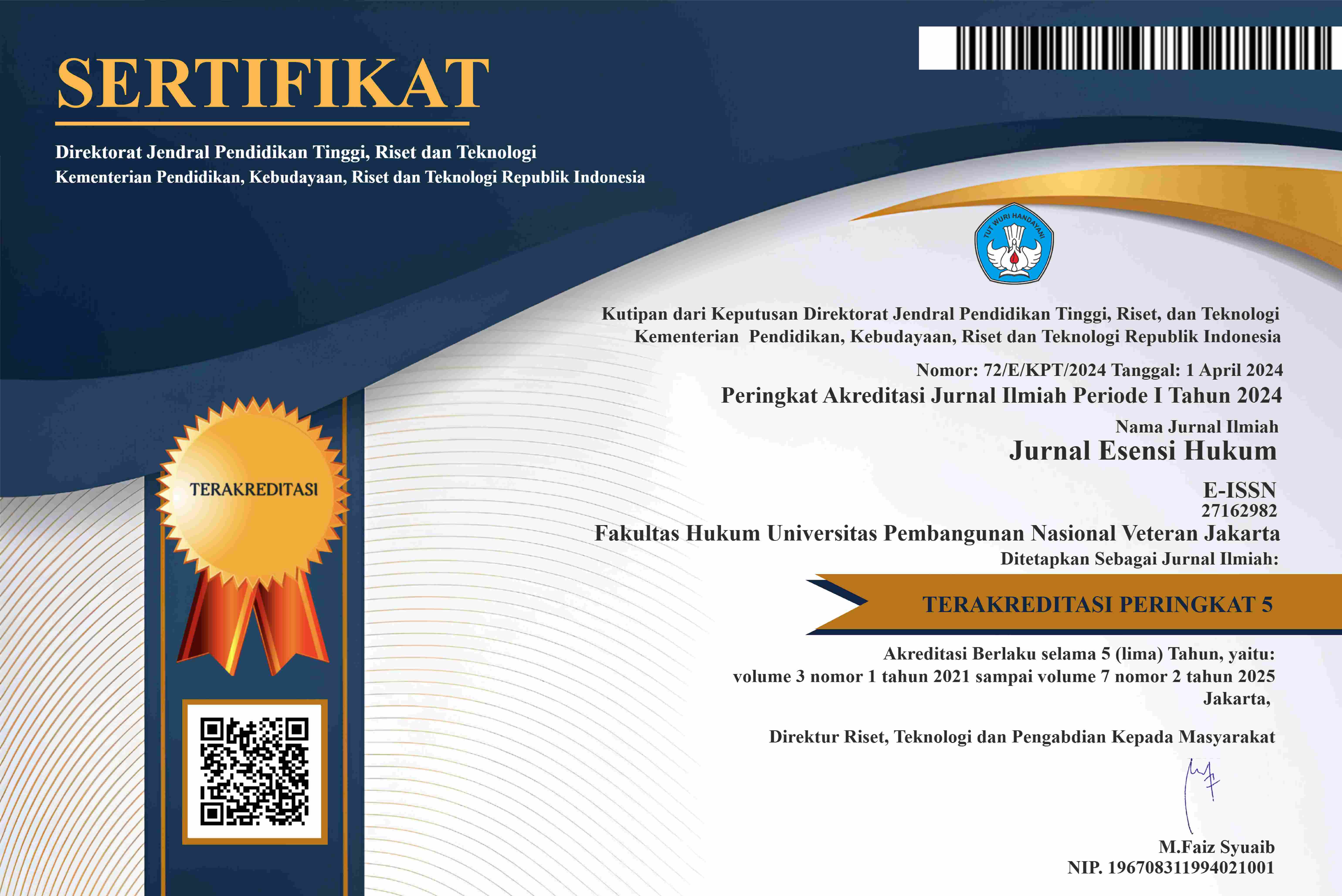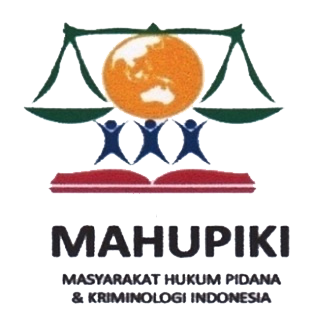Pelaksanaan Community Based Corrections: Studi Kasus Di Lembaga Pemasyarakatan Terbuka Kelas IIB Nusakambangan
Abstract
Overcrowding that occurs in correctional institutions encourages the need for alternatives to punishment that are more effective and oriented towards social reintegration. Community Based Corrections (CBC) is a new approach in the correctional system that is relevant to be implemented in the Nusakambangan Class IIB Open Prison. This study aims to analyze the implementation of Community Based Corrections in the Class IIB Nusakambangan Open Prison as a form of coaching that emphasizes the reintegration and rehabilitation of prisoners. The method used is a juridical-sociological approach with qualitative descriptive techniques, through document studies, interviews, and observations of the implementation of the CBC program. The results show that the implementation of CBC in Nusakambangan Open Prison has fulfilled basic principles such as community protection, proportionality, cost effectiveness, and restoration, although it still faces challenges in supervision and community participation. This research shows that CBC has the potential to become a future punishment policy that is more humane and efficient, and supports a correctional system that is oriented towards recovery and social integration.
Downloads
References
Daftar Pustaka
Ambarsari, H. A. N. (2018). PENERAPAN PRINSIP RESTORATIVE JUSTICE DALAM SISTEM PERADILAN PIDANA DI INDONESIA. X, 173–190.
Arto, B. (2024). Perubahan Perilaku Narapidana dengan Pembinaan Community- Based Treatment di Lembaga Pemasyarakatan Kelas IIB Terbuka Ciangir. 8, 20–42.
Bambang Waluyo. (2023). Sistem Pemasyarakatan di Indonesia. Penerbit : Sinar Grafika.
Bonta, J. (2018). Corrections research in Canada : Impressive progress and promising prospects. (April 1999). https://doi.org/10.3138/cjcrim.41.2.235
Fajriando, H. (2019). Evaluasi Pelaksanaan Community-Based Corrections di Lapas Terbuka Kelas III Rumbai. Jurnal Ilmiah Kebijakan Hukum, 13(3), 323. https://doi.org/10.30641/kebijakan.2019.v13.323-338
Hamja, (2015). Pemberdayaan Lembaga Pemasyarakatan Sebagai Wujud Pelaksanaan Community Based Corrections Di Dalam Sistem Peradilan Pidana Di Indonesia. Penerbit : Deepublish.
Hamja, H. and B. A. A. G. (2024). Analysis of Community-Based Correctional Implementation from a Legal Issues Perspective: A Global Survey. 223(3), 1–22.
Hidayat, M., & Subroto, M. (2022). Penerapan Konsep Community Based Correction Dalam Program Pembinaan. Jurnal Pendidikan Dan Konseling, 4(3), 323–332.
Lilis Lisnawati, Putu Pande S. A., Muhammad Mustofa, M. Ali Aranoval. 2015. Community Based Corrections Peluang dan Strategi Implementasi di Indonesia. Penerbit : Center for Detention Studies.
McCarthy, D. J. (2001). Community Based Corrections. Belmont, CA:Wadsworth.
Nugraha, A. (2020). Konsep Community Based Corrections Pada Sistem Pemasyarakatan Dalam Menghadapi Dampak Pemenjaraan. Jurnal Sains Sosio Huaniora, 4, 1–23.
Rahardiawan, B., Subroto, M., Pemasyarakatan, S. T., & Pemasyarakatan, P. I. (2023). Penerapan Community Based Correction dalam Upaya Peningkatan Pembinaan di Lembaga Pemasyarakatan. 6(April), 2545–2551.
Ricky Fahriza. (2020). Optimalisasi Tugas Dan Fungsi Pembimbing Kemasyarakatan Dalam Upaya Pencegahan Overcrowded Di Lembaga Pemasyarakatan. Reformasi Hukum, 24(2), 130–149. https://doi.org/10.46257/jrh.v24i2.102
Peraturan Perundang-Undangan
Undang – Undang No. 22 Tahun 2022 Tentang Pemasyarakatan;
Keputusan Menteri Kehakiman dan Hak Asasi Manusia Nomor: M.03.RR.07.03. Tahun 2003 tentang Pembentukan Lapas Terbuka;
Peraturan Menteri Hukum dan Hak Asasi Manusia Nomor 35 Tahun 2018 tentang Revitalisasi Penyelenggaraan Pemasyarakatan;
Peraturan Menteri Imigrasi dan Pemasyarakatan Nomor 1 Tahun 2025 tentang Pedoman Penyelenggaraan Makanan di Unit Pelaksana Teknis Pemasyarakatan;
Permenkumham No. 3 Tahun 2018 tentang syarat dan tata cara pemberian remisi, asimilasi, cuti mengunjungi keluarga, pembebasan bersyarat, cuti menjelang bebas, dan cuti bersyarat.
Copyright (c) 2025 Jurnal Esensi Hukum

This work is licensed under a Creative Commons Attribution-ShareAlike 4.0 International License.
Authors who publish with this Journal agree to the following terms:
1. Author retain copyright and grant the journal right of first publication with the work simultaneously licensed under a creative commons attribution license that allow others to share the work within an acknowledgement of the work’s authorship and initial publication of this journal.
2. Authors are able to enter into separate, additional contractual arrangement for the non-exclusive distribution of the journal’s published version of the work (e.g. acknowledgement of its initial publication in this journal).
3. Authors are permitted and encouraged to post their work online (e.g. in institutional repositories or on their websites) prior to and during the submission process, as it can lead to productive exchanges, as well as earlier and greater citation of published works.
4. 
This work is licensed under a Creative Commons Attribution-ShareAlike 4.0 International License.






2.png)

